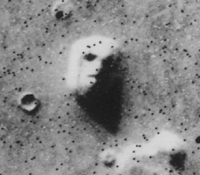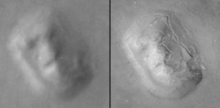pareidolia
Appearance
English
[edit]

Etymology
[edit]Borrowed from German Pareidolie, constructed from Ancient Greek παρα- (para-, “alongside”) + εἴδωλον (eídōlon, “image”) + -ία (-ía).
Pronunciation
[edit]- (Received Pronunciation) IPA(key): /ˌpæɹ.aɪˈdəʊ.li.ə/
- (General American)
- (without the Mary–marry–merry merger) IPA(key): /ˌpæɹ.iˈdoʊ.li.ə/, /ˌpæɹ.aɪˈdoʊ.li.ə/
- (Mary–marry–merry merger) IPA(key): /ˌpɛɹ.iˈdoʊ.li.ə/, /ˌpɛɹ.aɪˈdoʊ.li.ə/
Audio (General American): (file) - Rhymes: -əʊliə
- Hyphenation: par‧ei‧do‧lia
Noun
[edit]pareidolia (countable and uncountable, plural pareidolias)
- (psychology) The tendency to interpret a vague stimulus as something known to the observer, such as interpreting marks on Mars as canals, seeing shapes in clouds, or hearing hidden messages in music.
- Hypernym: apophenia
- 1868 July, John Sibbald, The British Journal of Psychiatry, volume 13, page 238:
- This last is called by Dr. Kahlbaum, changing hallucination, partial hallucination, perception of secondary images, or pareidolia.
- 1993, Raymond Moody, Paul Perry, Reunions: Visionary Encounters with Departed Loved Ones, New York, N.Y.: Random House, →ISBN, page 13:
- Pareidolia underlies several forms of divination.
- 2006, Steve W. Martin, “Choosing Your Battles”, in Heavy Hitter Selling: How Successful Salespeople Use Language and Intuition to Persuade Customers to Buy, Hoboken, N.J.: John Wiley & Sons, →ISBN, page 150:
- Pareidolias aren't solely limited to images. When I was a youngster, I remember listening to The Beatles' song "Strawberry Fields" over and over to hear what seemed to be "I buried Paul."
- 2010, Rick Emmer, “Nessies of the New World”, in Loch Ness Monster: Fact or Fiction? (Creature Scene Investigation), New York, N.Y.: Chelsea House Publishers, Infobase Publishing, →ISBN, page 81:
- Pareidolia is a state of mind where a vague or unclear image is perceived to be something recognizable, regardless of whether it's something you expect to see. The most famous example of pareidolia is the familiar face of the Man in the Moon.
Derived terms
[edit]Translations
[edit]tendency to interpret vague stimuli as something familiar
|
Further reading
[edit] pareidolia on Wikipedia.Wikipedia
pareidolia on Wikipedia.Wikipedia - Paul McFedries (2004 March 2) “pareidolia”, in Word Spy, Logophilia Limited, retrieved 4 June 2017.
- “pareidolia” in The Skeptic’s Dictionary
Italian
[edit]Etymology
[edit]From Ancient Greek παρα- (para-) + εἴδωλον (eídōlon).
Noun
[edit]pareidolia f (plural pareidolie)
Derived terms
[edit]Polish
[edit]Etymology
[edit]From Ancient Greek παρα- (para-, “alongside”) + εἴδωλον (eídōlon, “image”).
Pronunciation
[edit]Noun
[edit]pareidolia f
- pareidolia (tendency to interpret vague stimuli as something familiar)
Declension
[edit]Declension of pareidolia
| singular | |
|---|---|
| nominative | pareidolia |
| genitive | pareidolii |
| dative | pareidolii |
| accusative | pareidolię |
| instrumental | pareidolią |
| locative | pareidolii |
| vocative | pareidolio |
Further reading
[edit]- pareidolia in Polish dictionaries at PWN
Portuguese
[edit]Etymology
[edit]From Ancient Greek παρα- (para-, “alongside”) + εἴδωλον (eídōlon, “image”).
Pronunciation
[edit]
- Hyphenation: pa‧rei‧do‧li‧a
Noun
[edit]pareidolia f (plural pareidolias)
- pareidolia (tendency to interpret vague stimuli as something familiar)
Categories:
- English terms borrowed from German
- English terms derived from German
- English terms derived from Ancient Greek
- English 5-syllable words
- English terms with IPA pronunciation
- English terms with audio pronunciation
- Rhymes:English/əʊliə
- Rhymes:English/əʊliə/5 syllables
- English lemmas
- English nouns
- English uncountable nouns
- English countable nouns
- en:Psychology
- English terms with quotations
- en:Senses
- Italian terms derived from Ancient Greek
- Italian lemmas
- Italian nouns
- Italian countable nouns
- Italian feminine nouns
- Polish terms derived from Ancient Greek
- Polish 5-syllable words
- Polish terms with IPA pronunciation
- Polish terms with audio pronunciation
- Rhymes:Polish/ɔlja
- Rhymes:Polish/ɔlja/5 syllables
- Polish lemmas
- Polish nouns
- Polish feminine nouns
- Polish singularia tantum
- pl:Psychology
- pl:Senses
- Portuguese terms derived from Ancient Greek
- Portuguese 5-syllable words
- Portuguese terms with IPA pronunciation
- Portuguese lemmas
- Portuguese nouns
- Portuguese countable nouns
- Portuguese feminine nouns

